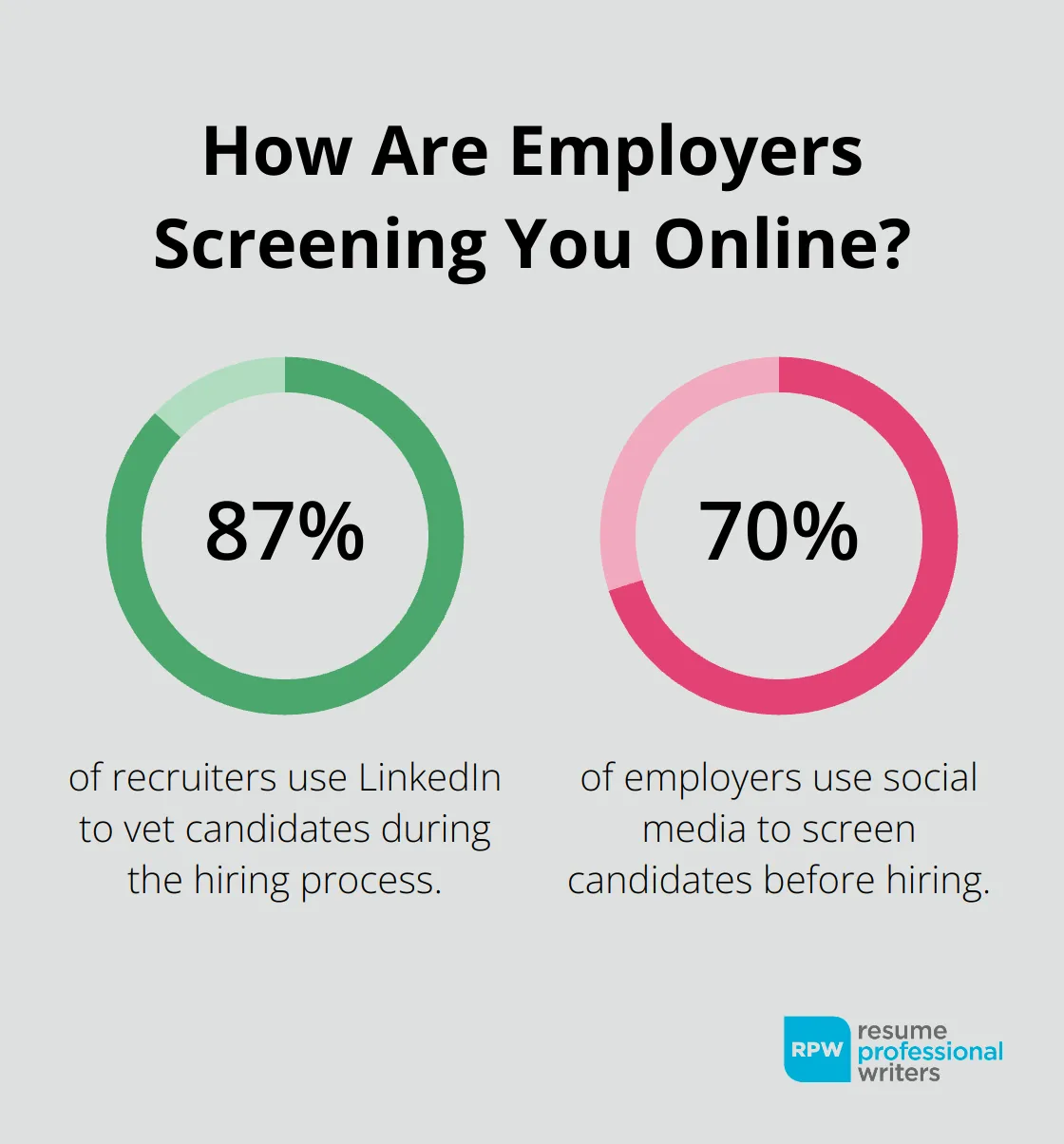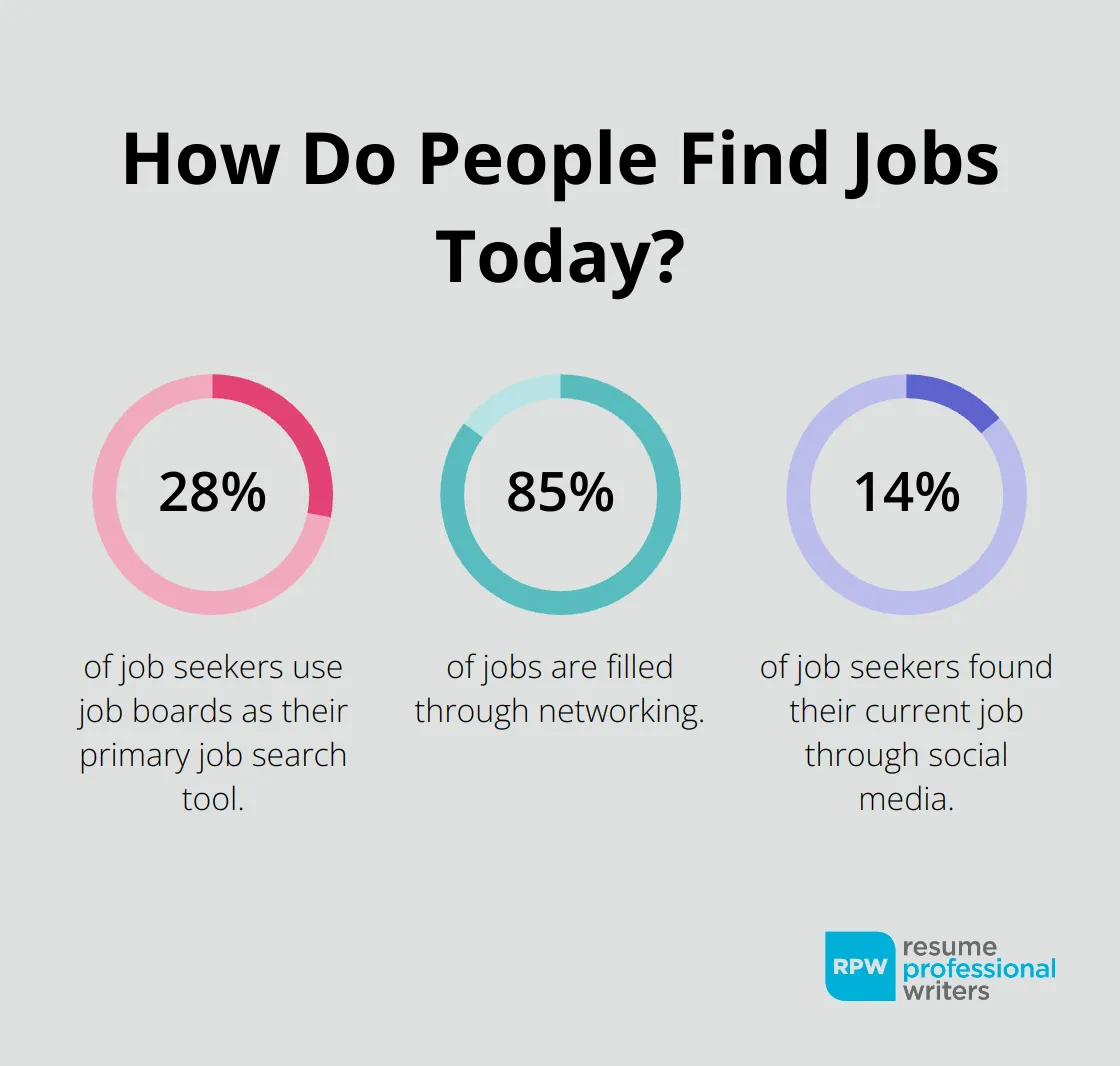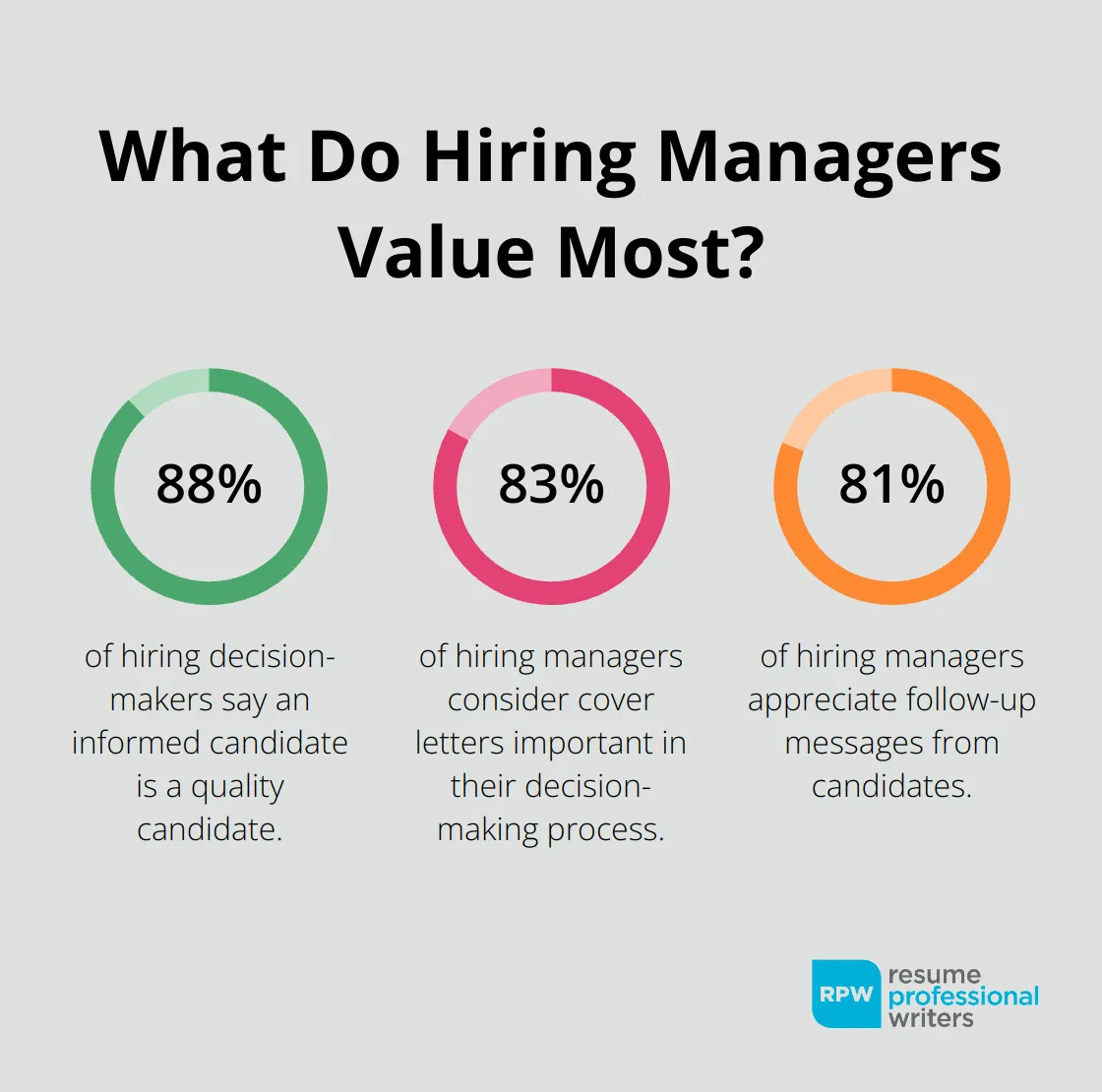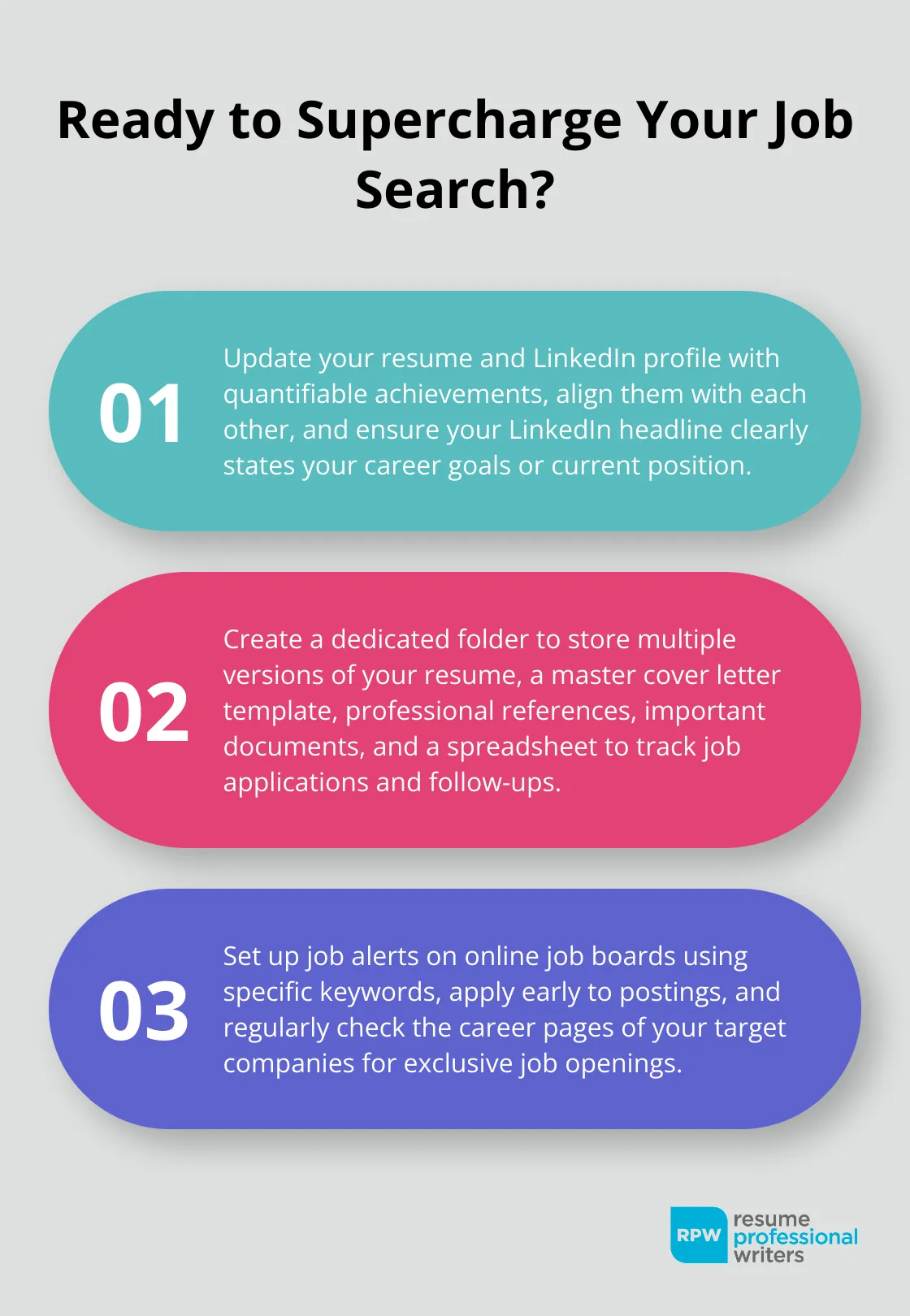We recognize the challenges of navigating today’s competitive job market. A well-structured job search strategy can significantly impact your ability to land your dream position.
This comprehensive job search strategy checklist will guide you through each step of the process, from preparation to securing an offer. Whether you’re a recent graduate or an experienced professional, these actionable tips will help you streamline your job search and improve your chances of success.
How to Prepare for Your Job Search
1. Revamp Your Resume and LinkedIn Profile
Your resume and LinkedIn profile create the first impression on potential employers. A study by Jobvite reveals that 87% of recruiters use LinkedIn to vet candidates during the hiring process. Start by updating your resume with your latest accomplishments, skills, and experiences. Quantify your achievements wherever possible. For example, replace “Increased sales” with “Increased sales by 25% over six months.”

Next, align your LinkedIn profile with your updated resume. Use a professional profile picture and craft a headline that clearly states your career goals or current position. Write a compelling summary that highlights your unique value proposition. Consider creating a resume outline to help structure your information effectively.
2. Set Clear Career Goals
Define your career goals before you apply for jobs. Ask yourself: What type of role do you seek? Which industries interest you? What company culture aligns with your values? Clear answers to these questions will help you focus your search and tailor your applications effectively.
Create a list of target positions and companies. Research these organizations thoroughly to understand their mission, values, and recent developments. This knowledge will help you customize your applications and prepare for potential interviews.
3. Stay Informed on Industry Trends
Keep up-to-date with industry trends to position yourself as a valuable candidate. Subscribe to industry publications, follow thought leaders on social media, and attend webinars or conferences in your field. Pay attention to emerging technologies, changing regulations, and shifts in market demands that could affect your industry.
Research salary expectations for your target positions. Websites like Glassdoor and PayScale offer salary information based on job titles, locations, and experience levels. This knowledge will prove invaluable when you negotiate job offers.
4. Cultivate Your Online Presence
Your online presence can make or break your job search in today’s digital age. A CareerBuilder survey found that 70% of employers use social media to screen candidates before hiring. Conduct a thorough audit of your online presence. Remove or privatize any content that could appear unprofessional.
Consider creating a personal website or portfolio to showcase your work and expertise (particularly important for creative professionals or those in tech-related fields). If you’re not ready for a full website, platforms like Medium or LinkedIn’s article feature allow you to publish content and demonstrate your industry knowledge.
5. Organize Your Job Search Materials
Create a dedicated folder (physical or digital) to store all your job search materials. This should include:
- Multiple versions of your resume tailored to different job types
- A master cover letter template that you can customize for each application
- A list of professional references (with their contact information)
- Copies of important documents (e.g., transcripts, certifications)
- A spreadsheet to track job applications and follow-ups
This organization will streamline your application process and ensure you’re always prepared to seize opportunities. Developing strong organizational skills can significantly boost your productivity during the job search.
With these preparation steps complete, you’ve laid a solid foundation for your job search. The next chapter will explore effective techniques to put your preparation into action and find the best job opportunities.
How to Find Job Opportunities
The digital age has transformed job searching into a multi-faceted process. A strategic approach can significantly increase your chances of landing your dream role. Here’s how to effectively find and pursue job opportunities:
1. Maximize Online Job Boards
Online job boards serve as a goldmine for job seekers. Platforms like Indeed, LinkedIn, and Glassdoor list millions of job openings across various industries. To optimize your use of these platforms:
- Use specific keywords related to your desired position and industry
- Set up job alerts for notifications about new postings that match your criteria
- Apply early to increase your chances of getting noticed
A study by Jobvite reveals that 28% of job seekers use job boards as their primary job search tool. However, don’t limit yourself to these platforms alone. Many companies post job openings exclusively on their websites, so check the career pages of your target companies regularly.
2. Expand Your Professional Network
Networking remains one of the most effective ways to find job opportunities. LinkedIn reports that 85% of jobs are filled through networking. To expand your professional network:
- Attend industry conferences
- Join professional associations
- Participate in online forums related to your field
These activities will help you stay informed about industry trends and connect you with potential employers and mentors.
Don’t underestimate the power of informational interviews. Reach out to professionals in your desired field or company for a brief chat about their career path. While these conversations may not lead directly to a job offer, they can provide valuable insights and expand your network.
3. Leverage Social Media for Job Leads
Social media platforms have become a hub for job opportunities. A survey by Clutch found that 14% of job seekers found their current job through social media. To leverage social media effectively:
- Follow companies you’re interested in on Twitter, Facebook, and LinkedIn
- Engage with content posted by these companies and industry leaders
- Share your thoughts on industry trends and showcase your expertise

This active participation can catch the attention of recruiters and hiring managers.
4. Consider Working with a Recruiter
Recruiters can be valuable allies in your job search, especially for mid to senior-level positions. They often have access to job openings that aren’t publicly advertised and can provide insights into the hiring process of specific companies.
When working with a recruiter:
- Be clear about your career goals and preferences
- Provide them with an updated resume
- Be responsive to their communications
Remember that recruiters work for employers, not job seekers, so maintain realistic expectations about their role in your job search.
While recruiters can be helpful, they shouldn’t be your only job search strategy. Continue your independent search efforts alongside working with a recruiter to maximize your opportunities.
The job search process requires a multi-pronged approach. In the next chapter, we’ll explore how to master the application process and stand out from other candidates.
How to Master the Application Process
1. Customize Your Application Materials
Tailoring your resume and cover letter for each application is essential. Recruiters spend an average of just 7.4 seconds reviewing a resume. To capture their attention, align your application materials with the job description and company culture.

Use the job posting as a guide to identify key skills and qualifications. Incorporate these into your resume, using the same terminology when possible. This demonstrates your fit for the role and helps your application pass through Applicant Tracking Systems (ATS).
For your cover letter, address the hiring manager by name if possible. ResumeLab research shows that 83% of hiring managers consider cover letters important in their decision-making process. Use the cover letter to tell a compelling story about why you’re the ideal candidate for the position.
2. Ace Your Interview
Preparation leads to interview success. Research common interview questions in your industry and practice your responses. The STAR method (Situation, Task, Action, Result) structures your answers to behavioral questions effectively.
Prepare thoughtful questions for your interviewer. This shows your genuine interest in the role and company. A survey by Glassdoor indicates that 88% of hiring decision-makers say an informed candidate is a quality candidate.
Don’t overlook virtual interviews. With the increase in remote work, many companies conduct initial interviews via video calls. Test your technology beforehand, choose a professional background, and maintain eye contact by looking directly at the camera.
3. Perfect Your Elevator Pitch
Your elevator pitch summarizes your professional background and career goals concisely. Make it engaging, memorable, and tailored to your audience. Practice delivering your pitch confidently in 30-60 seconds.
Use your elevator pitch during networking events, at the beginning of interviews, or when you encounter unexpected opportunities to discuss your career. A well-crafted elevator pitch can open doors and leave a lasting impression.
4. Follow Up Strategically
Following up after submitting an application or attending an interview is a critical step that many job seekers overlook. A survey by Robert Half found that 81% of hiring managers appreciate follow-up messages from candidates.
Send a thank-you email within 24 hours of your interview. Personalize it by referencing specific points from your conversation. This reinforces your interest in the position and keeps you top-of-mind for the hiring team.
If you haven’t heard back about an application, follow up after one to two weeks. Keep your message brief and professional, reiterating your interest in the role and asking about the next steps in the process.
5. Navigate Salary Negotiations
Salary negotiations can be intimidating, but they’re a vital part of the job search process. Glassdoor research reveals that 59% of American employees accepted the first salary they were offered and did not negotiate.
Before entering negotiations, research the typical salary range for the position in your industry and location. Use this information to set a realistic target salary. Be prepared to discuss your value proposition – the unique skills and experiences you bring to the role that justify your salary expectations.
Compensation isn’t just about salary. Consider the entire package, including benefits, bonuses, and opportunities for professional development. Try to prioritize your negotiation points based on your long-term career goals.
Navigating Your Job Search
A job search strategy checklist provides a comprehensive roadmap to guide you through every stage of the process. Persistence and adaptability are essential in today’s unpredictable job market. You must stay focused on your goals and maintain a positive attitude, even when faced with rejections or periods of silence from potential employers.

Each step of the checklist enhances your chances of success, from crafting a compelling resume to mastering salary negotiation. The most rewarding career paths often emerge unexpectedly, so remain open to new opportunities. Your dream job exists, and now is the time to pursue it with dedication and preparation.
We offer expert resume services tailored for various industries, helping job seekers stand out in competitive job markets. Our team provides ATS-friendly resumes, optimized LinkedIn profiles, and various tools to enhance your job search. Begin using this job search strategy checklist today to effectively navigate the job market and secure a position that aligns with your career goals.








